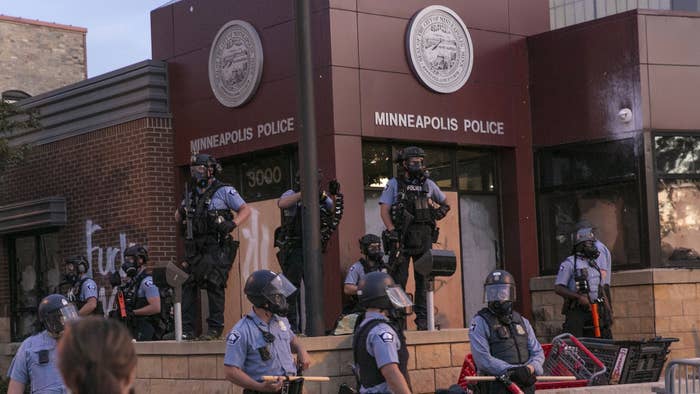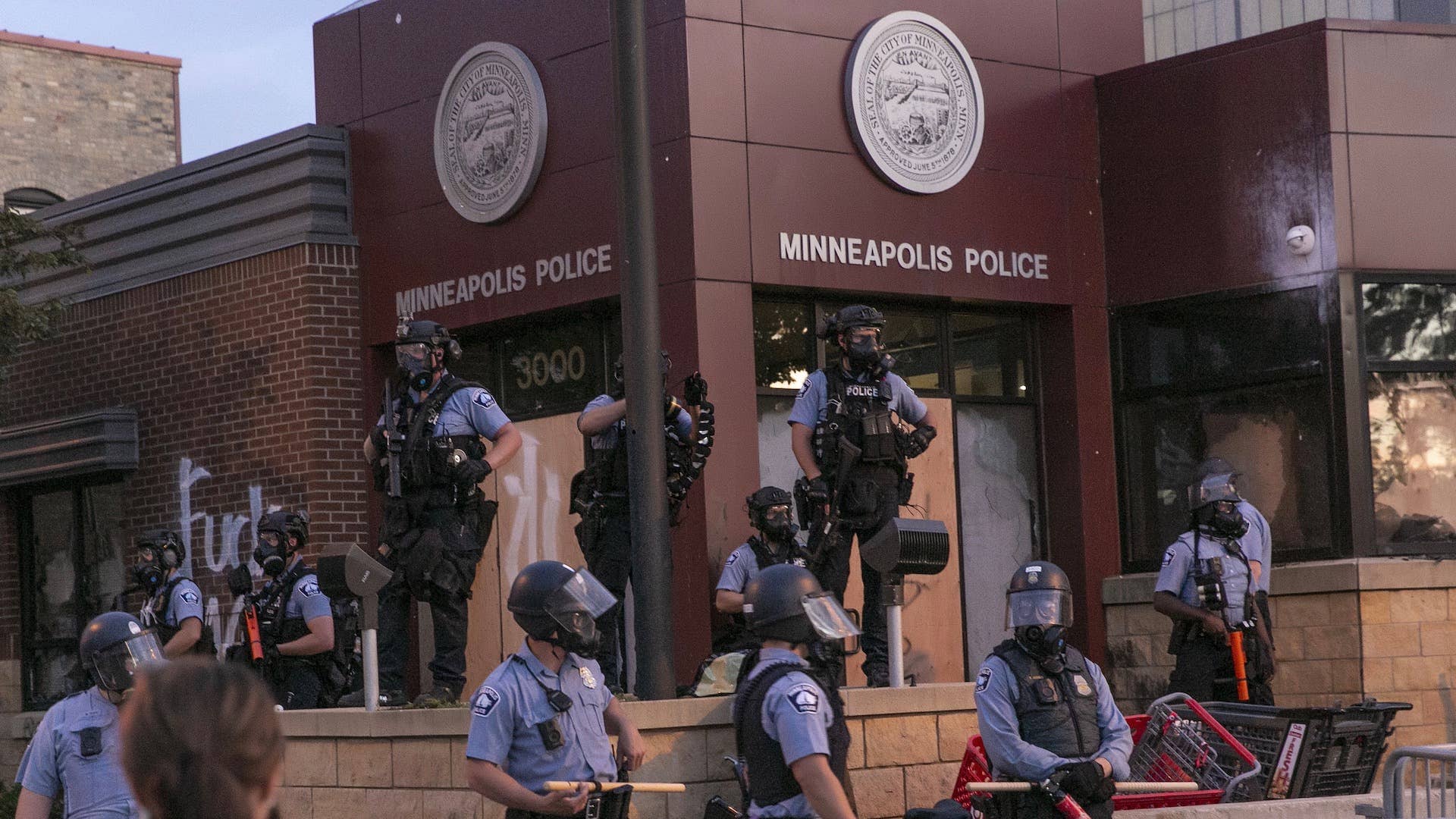
There are an estimated 18,000 police departments across the United States with, in total, more than $100 billion in funding. In Miami-Dade County, the police and corrections department receives almost $1 billion annually. In Los Angeles, total spending on police, including pensions and HR benefits, amounts to $3.1 billion. Minneapolis in 2020 spent $193.3 million on its police department, which employs 892 sworn officers and 175 civilian employees.
As the killing of George Floyd by ex-police officer Derek Chauvin continues to shake the already cracked bedrock of American life and society, activists who’ve peacefully taken to city streets across the country have revived calls to defund police. The argument is that departments are broken, from how they train officers to how they engage with their respective communities to how police are overseen and regulated. The defund movement calls for communities to completely rethink how they enforce the law and take care of their own. Even as many street officers and police union officials seem to be hardening their long-standing positions of self-preservation, some police leaders, like Dallas Police Chief David Brown, have admitted things must change.
So what is defunding the police? It’s not as simple as it sounds. Here’s what you need to know.
What is the history behind the Defund the Police movement?
In 2014 and 2015, officers in the New York City Police Department, in protest of Mayor Bill de Blasio, staged a slowdown during which they performed only mandatory functions. The expectation was that fewer cops engaged in Broken Windows policing would lead to an uptick in crime and thus prove how much the city needed its police force. The opposite occurred, and the number of arrests and police encounters like stop-and-frisks fell by half.
One of the first closely watched cities to dissolve its police department was Camden, New Jersey. In 2012, the city’s crime rates and poverty were among the worst in the country, according to CNN. Corruption like evidence planting and false reports were so widespread that 88 convictions were overturned in 2013, according to the ACLU.
While the city's police department was disbanded, a new larger force was formed and critics say it is hardly a model for guidance to defund or abolish police. The expanded department cited residents more often, leading local courts to become clogged with tens of thousands of new cases. It also added more than 100 cameras, putting almost the entirety of the city surveillance, ShotSpotter microphones, license plate readers, and a command center to direct officers on the ground. Meanwhile, a new use-of-force policy was credited with reducing the number of violent police-related incidents.
"What the Camden model represents is a police reform project to make the slight shift from mass incarceration—the overreliance on imprisonment to address social problems—to mass supervision, the use of police and surveillance to manage the social problems outside prison," University of Southern Main criminology professor Brendan McQuade wrote in The Appeal.
It wasn’t a total defunding, though. That same year, the Camden County Police Department was established, and since then violent crimes have dropped 47% thanks to widespread community engagement that begins the moment a new recruit starts on the job.
What would the process of defunding the police entail?
While some have called for the wholesale dissolution of police forces in favor of a range of better-supported community services, many activists are instead demanding a reduction in what they say are massive police department budgets for agencies unprepared to deal with issues like mental health.
Many support efforts like RIGHT Care, a pilot program underway in Dallas that sought to help relieve area jails that were becoming crowded with the mentally ill. Instead of police cars loaded with armed officers showing up to 911 calls, a social worker and a paramedic would accompany a single officer, hoping to resolve an incident without the need for violence or an arrest.
Some police themselves admit other agencies, groups, and professionals require funding and support in order to provide community safety.
“We’re asking cops to do too much in this country,” Dallas Police Chief David Brown said in 2016, after five of his officers were targeted by a mass shooter. “Every societal failure, we put it off on the cops to solve. Not enough mental health funding, let the cops handle it… Here in Dallas, we got a loose dog problem; let’s have the cops chase loose dogs. Schools fail; let’s give it to the cops… That’s too much to ask. Policing was never meant to solve all those problems.”
What is the difference between “dismantling” and “defunding” the police?
Black Lives Matter co-founder Patrisse Cullors said defunding the police means spending the money that currently goes to law enforcement departments to people and services in marginalized communities.
That “means that we are reducing the ability for law enforcement to have resources that harm our communities,” Cullors said in an interview with WBUR, Boston’s public radio station. “It’s about reinvesting those dollars into Black communities, communities that have been deeply divested from.”
As departments in Camden and Minneapolis enforce defunding, it is important to note that dismantling the police is a different construct that involves people power. In cities that choose to do it, civilians would have the ability to police their own communities, said Patrick Oliver, a retired police chief and the director of Cedarville University’s criminal justice program. “They'll use civilians instead of sworn officers to conduct investigation and do traffic enforcement, to do internal affairs investigations, to respond to calls for service that are not enforcement actions.”
What actionable steps have already been taken?
On June 7, nine members of the Minneapolis City Council pledged to dismantle the city’s police department, calling it irreparably broken. Though their pledges were not an official vote, the number of council members in support constituted a veto-proof majority, all but ensuring the agency that employed the ex-officer who killed Floyd would be disbanded should the measure enter City Hall.
Minneapolis is looking to cut $200 million from its $1.3 billion annual budget, according to City Council President Lisa Bender. The police budget in 2020 was $189 million. Bender has said she hopes to move money to other areas of the city that are in need.
Why can’t Joe Biden and Donald Trump afford to ignore this issue?
Calls to defund the police began to take on presidential political implications almost as soon as the chants emerged from protesters’ mouths.
President Donald Trump quickly jumped to the police’s defense and has stayed on the offensive, tweeting on June 11, “The Radical Left Democrats: First they try to take away your guns. Then they try to take away your police!” A recent ABC News/Ipsos poll found that just one in three (34%) support the movement to "defund the police," while 39% support reducing the budget by shifting to programs related to mental health, housing, and education. Trump has sought to paint anyone who talks of defunding or redirecting any funds as a crazed liberal, and has announced his own plans for police reform.
“We’re working to finalize an executive order that will encourage police departments nationwide to meet the most current professional standards for the use of force, including tactics for de-escalation,” Trump said at a roundtable with law enforcement in Dallas, according to Politico. “Also, we’ll encourage pilot programs that allow social workers to join certain law enforcement officers so that they work together.”
Meanwhile, congress this week released the Justice in Policing Act of 2020, which would, among other things, bar police departments from using chokeholds.
Former Vice President Joe Biden and Democrats have been the subject of public ridicule after fumbling the conversation about police reform in this country. Now, the presidential candidate will find himself in a precarious position as we enter into primary season and he’s made it no secret he’s not into defunding the police.
“I’ve long been a firm believer in the power of community policing—getting cops out of their cruisers and building relationships with the people and the communities they are there to serve and protect,” Biden wrote in a USA Today op-ed. "Every single police department should have the money they need to institute real reforms like adopting a national use of force standard, buying body cameras, and recruiting more diverse police officers."
What are elected officials saying or doing?
Earlier this month, Los Angeles Mayor Eric Garcetti announced he would walk back a planned increase in the city’s police department’s budget to $1.86 billion and instead redirect $150 million of police funding toward other services. San Francisco’s mayor, London Breed, has vowed similar action, although she did not cite a specific dollar figure. Local leaders in New York City have pledged to cut from the police department’s $6 billion budget, especially as programs like education and youth activities were slashed.
According to CityLab, lawmakers in 16 large U.S. cities, ranging from Seattle and Portland to St. Louis and Durham, North Carolina, have either proposed or pledged to remove funding from police departments.
Last year, Durham’s city council decided to raise wages for part-time government workers instead of granting $1.2 million to the city’s police department to onboard 18 new police officers. City officials in Rochester, New York, started removing police officers from public schools last year, with calls to remove the rest during an upcoming planning cycle. Denver is following suit, as a majority of school board members and the superintendent announced support for the move.
What’s the opposition’s argument for not defunding the police?
President Trump has not been the lone voice in supporting police across the country. Even former presidential candidate Bernie Sander has pushed back against calls to abolish polish, instead calling for better training and better pay as part of his plan for criminal justice reform.
“Do I think we should not have police departments in America? No, I don’t,” he told the New Yorker. “There’s no city in the world that does not have police departments.”
The staunchest opposition has come from police themselves. In an op-ed on CNN’s website, Law Enforcement Legal Defense Fund president Jason C. Johnson and retired FBI supervisory special agent James A. Gagliano called defunding the police “foolhardy and dangerous” and argued that “defunding will have an adverse effect on citizens most in need of police protection.” They call it a knee-jerk reaction and instead point to what they say are the hundreds of millions of positive police interactions with the public that occur annually and without media coverage.
How can we learn more information and help to defund the police?
The No. 1 thing anyone can do who wants to help is to research how much of their city’s budget goes toward police. You can then lobby your lawmakers to reallocate that spending toward healthcare, education, and housing. There are local efforts underway in Minneapolis and numerous major cities. If you’re able to, attend your local city council meetings to be part of the conversation on the budget.
Reclaim the Block is a Minneapolis organization that encourages the city to move dollars away from the police and toward “community-led safety initiatives.” Communities United for Police Reform in New York City works to end discriminatory policing and seeks a $1 billion budget cut to the NYPD through its #NYCBudgetJusticeCampaign. In the least, you can sign the #DefundThePolice petition at Black Lives Matter.

